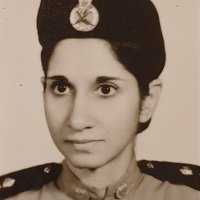
A blog of the Middle East Women's Initiative
This is the story of how I became the first female police officer in the Arab world. I was born and raised in Bahrain, which has a rich history of championing women’s rights in the region. Recently, for example, Bahrain has made notable progress in the public sector, with women representing 48% of the public sector workforce. We were the first Arab state to integrate women into police forces. We not only set an example for other regional states, but were involved in training other female police officers in the Arab world.
Due to gender segregation and local customs that prohibit physical inspection of women by male police offers, Bahrain’s leadership began pushing for female inclusion in police forces even before the state became independent in 1971. In 1970, I was recruited alongside one other colleague—Aisha Al Thawadi—to become the first two female police officers in the country. Initially, our unit handled cases involving female and child victims and offenders. [MOU1] Now the Women’s Police Directorate is involved in all aspects of policing—from customs and border control, to forensics and crime scene investigation—to everything in between.
I never imagined that I would become a police officer. But after completing a bachelor’s degree in the social sciences in Cairo, I returned back to Bahrain with the idea of working in the domain of social work. When I went to the authority on social welfare to start looking for a job, the head of the division told me that one aspect of social work that was overlooked was how to deal with crimes that involved the domestic sphere and juveniles. For this they really needed female police officers and he wanted me to consider it, if only for a short period of time. Though I was hesitant, I decided to try out this unique opportunity and worked there for a very challenging few months.
I found there were many mechanisms that needed to be reviewed and people who needed care and safe houses. One of my main tasks was to visit problematic homes and try to understand the social issues. It was essential to address the roots of these issues rather than move forward with convictions right away. We needed to provide care and monitor the situation. These technical and social challenges further incentivized me to pursue this position and work hard. I worked for several months, going to bookstores to research every issue that plagued families in Bahrain.
Several cases and crimes revolved around family problems and domestic abuse. There also seemed to be a lot of cases regarding petty crimes done by juveniles, especially by those who had run away from abusive homes. To deal with these problems legally and support juveniles instead of criminalizing them, we stressed the importance of a draft law, known as the juvenile care law to the Ministry of Interior several times. After a lot of hard work, it was finally passed in 1976 and it helped our work tremendously by regulating child custody and the treatment of juveniles. Most importantly, it introduced rehabilitation paths that allowed these children to reintegrate into the society.
Not only was it a challenge to address the social problems that existed, but it was also challenging as a woman in the male-dominated environment of the security services. Thankfully, the internal leadership at the police supported us tremendously—they knew that we were a critical asset to the security forces and sought out ways to help us grow. For example, we were sent to England to participate in training programs meant for women in the security forces.
Though my family didn’t imagine me in this career, they saw how passionate I was about it. Over time, as they saw my progress, they supported me in every way they could. This support and encouragement from our male colleagues in the police forces was essential to my success.
The Women Police General Directorate was officially formed in 1979. Today, there are hundreds of women in the security forces in Bahrain. They have an influential role in forwarding changes to accommodate women in their profession based on their personal needs, as well as religious and cultural values.
Bahraini women police have also played a vital role in empowering women in police forces in the region. For example, the current General Director of the Women’s Police Directorate, Brigadier General Mona Abdulraheem, trained the first batch of police women in Kuwait in 2008 and helped establish their police unit.
Though there is still a lot of work to be done in terms of women’s rights in the region as a whole, in Bahrain we have played a key role in shaping our community and society—even in spheres like security that have traditionally been seen as masculine. I am proud to be part of this history.
Author


Middle East Program
The Wilson Center’s Middle East Program serves as a crucial resource for the policymaking community and beyond, providing analyses and research that helps inform US foreign policymaking, stimulates public debate, and expands knowledge about issues in the wider Middle East and North Africa (MENA) region. Read more


Middle East Women's Initiative
The Middle East Women's Initiative (MEWI) promotes the empowerment of women in the region through an open and inclusive dialogue with women leaders from the Middle East and continuous research. Read more

Explore More in Enheduanna
Browse Enheduanna
Women are the Catalysts for Change in Lebanon

How Education Can Empower Young Women in MENA


